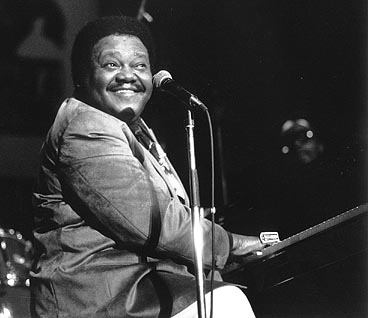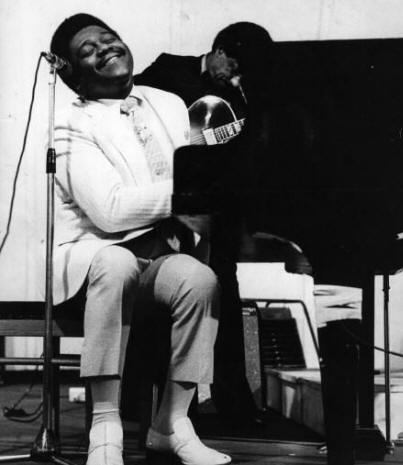<Back to Index>
- Songwriter and Singer Antoine Dominique "Fats" Domino Jr., 1928
PAGE SPONSOR
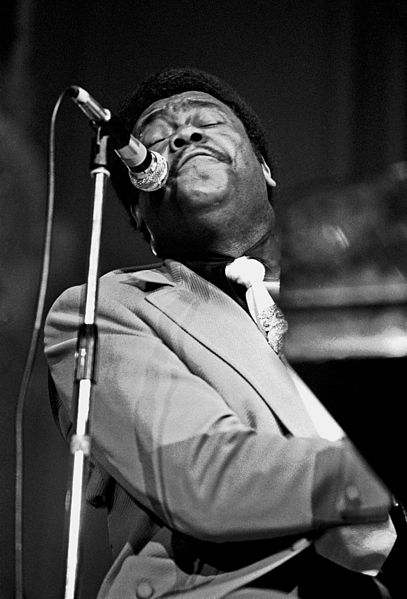
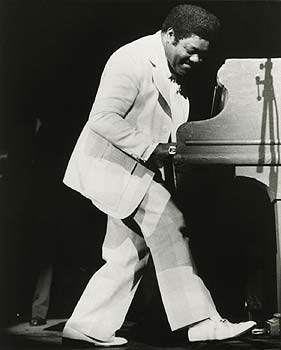
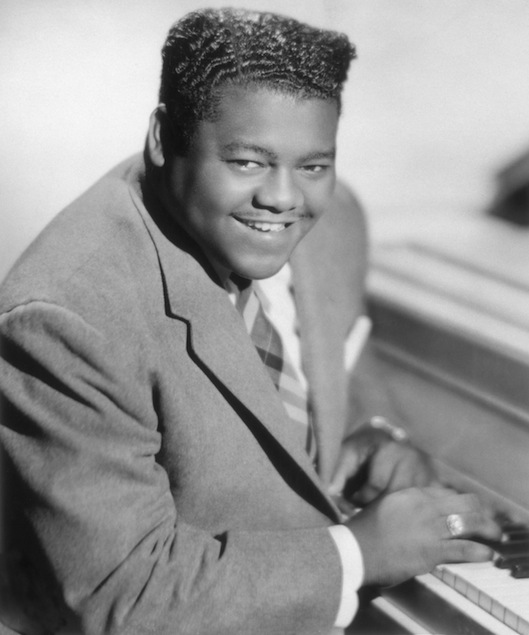
Antoine Dominique "Fats" Domino Jr. (born February 26, 1928) is an American R&B and rock and roll pianist and singer songwriter. He was born and raised in New Orleans, Louisiana, and Creole was his first language.
Domino first attracted national attention with "The Fat Man" in 1949 on Imperial Records. This song is an early rock and roll record, featuring a rolling piano and Domino doing "wah-wah" vocalizing over a strong back beat. It sold over a million copies and is widely regarded as the first rock and roll record to do so.
Fats Domino released a series of hit songs with producer and co-writer Dave Bartholomew, saxophonists Herbert Hardesty and Alvin "Red" Tyler and drummer Earl Palmer. Other notable and long standing musicians in Domino's band were saxophonists Reggie Houston, Lee Allen, and Fred Kemp, Domino's trusted bandleader. Domino finally crossed into the pop mainstream with "Ain't That A Shame" (1955), which hit the Top Ten, though Pat Boone characteristically hit #1 with a milder cover of the song that received wider radio airplay in a racially segregated era. Domino eventually had 37 Top 40 singles.
Domino's first album, Carry on Rockin', was released under the Imperial imprint, #9009, in November 1955 and subsequently reissued as Rock and Rollin' with Fats Domino in 1956. Combining a number of his hits along with some tracks that had not yet been released as singles, the album went on under its alternate title to reach #17 on the "Pop Albums" chart.
His 1956 up-tempo version of the 1940 Vincent Rose, Al Lewis & Larry Stock song, "Blueberry Hill" reached #2 in the Top 40, was #1 on the R&B charts for 11 weeks, and was his biggest hit. "Blueberry Hill" sold more than 5 million copies worldwide in 1956 – 57. The song had earlier been recorded by Gene Autry, and Louis Armstrong among many others. He had further hit singles between 1956 and 1959, including "When My Dreamboat Comes Home" (Pop #14), "I'm Walkin'" (Pop #4), "Valley of Tears" (Pop #8), "It's You I Love" (Pop #6), "Whole Lotta Loving" (Pop #6), "I Want to Walk You Home" (Pop #8), and "Be My Guest" (Pop #8).
Domino appeared in two films released in 1956: Shake, Rattle & Rock! and The Girl Can't Help It. On December 18, 1957, Domino's hit "The Big Beat" was featured on Dick Clark's American Bandstand.
On January 2, 1956, a riot broke out at Fats Domino's show in Fayetteville, NC, with police resorting to tear gas to break up the unruly crowd. Domino jumped out of a window to avoid the melee; he and two other band members were slightly injured.
Domino
continued to have a steady series of hits for Imperial through early
1962, including "Walkin' to New Orleans" (1960) (Pop #6), co-written by Bobby Charles, and "My Girl Josephine"
(Pop #14) from the same year. After Imperial Records was sold to
outside interests in early 1963, Domino left the label: "I stuck with
them until they sold out," he claimed in 1979. In all, Domino recorded
over 60 singles for the label, placing 40 songs in the top 10 on the
R&B charts, and scoring 11 top 10 singles on the pop charts.
Twenty - two of Domino's Imperial singles were double - sided hits.
Domino moved to ABC - Paramount Records in 1963. The label dictated that he record in Nashville rather than New Orleans. He was assigned a new producer (Felton Jarvis) and a new arranger (Bill Justis); Domino's long term collaboration with producer / arranger / frequent co-writer Dave Bartholomew, who oversaw virtually all of his Imperial hits, was seemingly at an end.
Jarvis and Justis changed the Domino sound somewhat, notably by adding the backing of a countrypolitan style vocal chorus to most of his new recordings. Perhaps as a result of this tinkering with an established formula, Domino's chart career was drastically curtailed. He released 11 singles for ABC - Paramount, but only had one top 40 entry with "Red Sails In The Sunset" (1963). By the end of 1964 the British Invasion had changed the tastes of the record buying public, and Domino's chart run was over.
Despite the lack of chart success, Domino continued to record steadily until about 1970, leaving ABC - Paramount in mid 1965 and recording for a variety of other labels: Mercury, Dave Bartholomew's small Broadmoor label (reuniting with Bartholomew along the way), and Reprise. His final chart single was on Reprise, a cover of The Beatles' "Lady Madonna" which peaked at #100 in 1968. He also continued as a popular live act for several decades.
He made a cameo appearance in the movie Any Which Way You Can, filmed in 1979 and released in 1980.
In the 1980s, Domino decided he would no longer leave New Orleans, having a comfortable income from royalties and a dislike for touring, and claiming he could not get any food that he liked any place else. His induction into the Rock and Roll Hall of Fame and an invitation to perform at the White House failed to persuade Domino to make an exception to this policy.
Fats Domino was persuaded to perform out of town periodically for Dianna Chenevert, agent, founder and president of New Orleans based Omni Attractions, during the 1980s and early 1990s. Most of these engagements were in and around New Orleans, but also included a concert in Texas at West End Market Place in downtown Dallas on October 24, 1986.
On October 12, 1983, USA Today reported that Domino was included in Chenevert's Southern Stars poster which was created for the agency (along with historically preserving childhood photographs of other famous living musicians from New Orleans and Louisiana). Domino provided a photograph of his first recording session, which was the only one he had left from his childhood. Domino autographed these posters, whose recipients included USA Today's Gannett president Al Neuharth, and Peter Morton founder of the Hard Rock Cafe. Times - Picayune columnist Betty Guillaud noted on September 30, 1987 that Domino also provided Chenevert with an autographed pair of his shoes (and signed a black grand piano lid) for the Hard Rock location in New Orleans.
Domino lived in a mansion in a predominantly working class Lower Ninth Ward neighborhood, where he was a familiar sight in his bright pink Cadillac automobile. He makes yearly appearances at the New Orleans Jazz and Heritage Festival and other local events. Domino was awarded the Grammy Lifetime Achievement Award in 1987. In 1998, President Clinton awarded him the National Medal of Arts. In 2004, Rolling Stone ranked him #25 on their list of the "100 Greatest Artists of All Time."
When Hurricane Katrina was approaching New Orleans in August 2005, Dianna Chenevert encouraged Domino to evacuate, but he chose to stay at home with his family, partly because of his wife Rosemary's poor health. His house was in an area that was heavily flooded. Chenevert e-mailed writers at the Times Picayune newspaper and the Coast Guard with the Dominos' location. Someone thought Domino was dead, and spray painted a message on his home, "RIP Fats. You will be missed", which was shown in news photos. On September 1, talent agent, Al Embry, announced that he had not heard from the musician since before the hurricane had struck. Later that day, CNN reported that Domino was rescued by a Coast Guard helicopter. Embry confirmed that Domino and his family had been rescued. The Domino family was then taken to a Baton Rouge shelter, after which they were picked up by JaMarcus Russell, the starting quarterback of the Louisiana State University football team, and Fats' granddaughter's boyfriend. He let the Dominos stay in his apartment. The Washington Post reported that on September 2, they had left Russell's apartment after sleeping three nights on the couch. "We've lost everything," Domino said, according to the Post. By January 2006, work to gut and repair Domino's home and office had begun. For the meantime, the Domino family is residing in Harvey, Louisiana.
Chenevert replaced the Southern Stars poster Fats Domino lost in Katrina and President George W. Bush also made a personal visit and replaced the National Medal of Arts that President Bill Clinton had previously awarded Fats. The gold records were replaced by the RIAA and Imperial Records catalog owner Capitol Records.
Domino was the first artist to be announced as scheduled to perform at the 2006 Jazz & Heritage Festival. However, he was too ill to perform when scheduled and was only able to offer the audience an on-stage greeting. Domino also released an album Alive and Kickin' in early 2006 to benefit the Tipitina's Foundation, which supports indigent local musicians. The title song was recorded after Katrina, but most of the cuts were from unreleased sessions in the 1990s.
On January 12, 2007, Domino was honored with OffBeat magazine's Lifetime Achievement Award at the annual Best of the Beat Awards held at House of Blues in New Orleans. New Orleans Mayor Ray Nagin declared the day "Fats Domino Day in New Orleans" and presented Fats Domino with a signed declaration. OffBeat publisher Jan Ramsey and WWL-TV's Eric Paulsen presented Fats Domino with the Lifetime Achievement Award. An all-star musical tribute followed with an introduction by the legendary producer Cosimo Matassa. The Lil' Band O' Gold rhythm section, Warren Storm, Kenny Bill Stinson, David Egan and C.C. Adcock, not only anchored the band, but each contributed lead vocals, swamp pop legend Warren Storm leading off with "Let the Four Winds Blow" and "The Prisoner Song," which he proudly introduced by saying, "Fats Domino recorded this in 1958.. and so did I." The horn section included Lil' Band O' Gold's Dickie Landry, the Iguanas' Derek Huston, and long time Domino horn men Roger Lewis, Elliot "Stackman" Callier and Herb Hardesty. They were joined by Jon Cleary (who also played guitar in the rhythm section), Al "Carnival Time" Johnson, Irma Thomas, George Porter, Jr. (who, naturally, came up with a funky arrangement for "You Keep On Knocking"), Art Neville, Dr. John and Allen Toussaint, who wrote and debuted a song in tribute of Domino for the occasion. Though Domino didn't perform, those near him recall him playing air piano and singing along to his own songs.
Fats Domino returned to stage on May 19, 2007, at Tipitina's at New Orleans, performing to a full house. A foundation has been formed and a show is being planned for Domino and the restoration of his home, where he intends to return someday. "I like it down there" he said in a February, 2006 CBS News interview.
In September 2007, Domino was inducted into the Louisiana Music Hall of Fame. He has also been inducted into the Delta Music Museum Hall of Fame in Ferriday. In December 2007, Fats Domino was inducted into the Hit Parade Hall of Fame.
In May 2009, Domino made an unexpected appearance for The Domino Effect, a namesake concert aimed at raising funds to help rebuild schools and playgrounds damaged by Hurricane Katrina.
He
was an important influence on the music of the 1960s and 1970s and
acknowledged as such by some of the top artists of that era. Paul McCartney reportedly wrote the Beatles song "Lady Madonna" in an emulation of Domino's style, combining it with a nod to Humphrey Lyttelton's 1956 hit "Bad Penny Blues," a record Joe Meek engineered. Domino
did manage to return to the "Hot 100" charts one final time in
1968 — with his own recording of "Lady Madonna." That recording, as well
as covers of two other Beatles songs, appeared on his Reprise LP Fats Is Back, produced by Richard Perry and recorded by a band that included New Orleans piano player James Booker;
Domino played piano only on one track, "I'm Ready." Also was the
influence behind the naming of Jamaican ska band Justin Hinds and the
Dominoes in the 1960s; Justin's favorite singer being Fats Domino. Both John Lennon and
Paul McCartney later recorded Fats Domino songs. Domino's rhythm,
accentuating the offbeat as in the song "Be My Guest," was an influence
on ska music.
